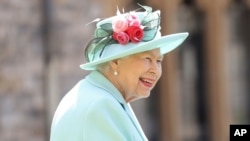A prominent lawmaker from Britain’s ruling Conservative Party has claimed that China is pressuring Barbados to remove Queen Elizabeth as head of state.
The Caribbean island nation’s Governor-General Sandra Mason announced the move as she opened a new session of the Barbadian Parliament last month, saying it was time to “fully leave our colonial past behind.”
“Barbadians want a Barbadian head of state. This is the ultimate statement of confidence in who we are and what we are capable of achieving. Hence, Barbados will take the next logical step towards full sovereignty and become a republic by the time we celebrate our 55th anniversary of independence” in 2021, Mason told lawmakers in Bridgetown.
Tom Tugendhat, chairman of the British Parliament’s Foreign Affairs Select Committee, told The Times of London newspaper last week that “China has been using infrastructure investment and debt diplomacy as a means of control for a while, and it’s coming closer to home for us.”
“Today, we’re seeing it in the Caribbean. Some islands seem to be close to swapping a symbolic queen in Windsor for a real and demanding emperor in Beijing,” Tugendhat said.
Barbados signed up to China’s Belt and Road Initiative last year. Many analysts say that while China has been investing heavily in the region in competition with Western nations, claims that Beijing has forced Barbados’ decision to become a republic are wide of the mark.
“I don’t think China’s the reason Barbados is changing who’s going to be the head of state,” Scott MacDonald, a senior associate at the Washington-based Center for Strategic and International Studies, said in a recent Skype interview with VOA. “China’s role in the Caribbean is large. They have economic statecraft. They come with a large checkbook. But as one Barbadian ambassador said to me, ‘You know, if nothing else fails, blame the Chinese.’ ”
Philip Murphy, director of the Institute of Commonwealth Studies at the University of London, agreed.
“I think it’s unlikely that there’s been significant foreign influence over this, from China or anywhere else,” Murphy told VOA. “There’s been a growing consensus in Barbados behind moving towards a republic for about 20 years. The question is whether the ruling party has the constitutional mandate to do that. And the Barbados Labor Party now has that.”
The Chinese Embassy in Britain issued a statement following Tugendhat’s comments, saying, “We deplore and oppose the comments that distort China-Barbados relations. China is committed to developing relations with other countries on the basis of mutual respect and noninterference. It is definitely not China’s tradition to interfere in others' domestic affairs, nor are we interested or willing to do so.”
Queen Elizabeth II last visited Barbados on the eve of its independence from Britain in 1966. The island nation kept the monarch as head of state.
Guy Hewitt, Barbadian high commissioner to Britain from 2014 to 2018, said Britain’s colonial past has come under the spotlight with the rise of the Black Lives Matter movement.
“What has happened … is this reassessing of our relationship with Britain as a former colonial power and with the royal family, in terms of what has been their position on these issues,” Hewitt told VOA.
Hewitt, now a pastor in Florida, said Prince Harry’s marriage to Meghan Markle, who is of mixed heritage, and their decision to quit their formal roles in the royal family have played a prominent role in the debate on Barbados. Harry visited the island in 2016.
“His marriage and subsequent articulation of Britain’s need to come to terms with its uncomfortable history of racism and exploitation resonated. And when they sought to enact a ‘royal divorce,’ I think those events gave impetus for Barbados to follow suit,” Hewitt said.
Hewitt cites the so-called Windrush scandal as a turning point. After World War II, thousands of migrants went to Britain from its Caribbean colonies to help fill labor shortages. They became known as the "Windrush generation" after the Empire Windrush, the ship that brought many of them to British shores.
In 2018, news emerged that hundreds were wrongly detained and denied basic rights, including health care and pensions. Dozens were deported back to the Caribbean, despite qualifying as British citizens.
“We realized that the ‘mother country,’ as Britain was affectionately known as, was not interested in the welfare and the well-being of people who had journeyed from the Caribbean, journeyed from Barbados, and helped build Britain in the post-World War II era,” Hewitt said.
Britain has apologized and offered compensation to those affected by the scandal. Critics say those efforts are taking far too long. Many of the Windrush generation are still suffering because of their historical treatment at the hands of the British government.
Responding to the announcement by Barbados last month, the British royal family said the future head of state was a matter for its people. Barbados will remain a member of the Commonwealth.
While there is public support for removing the queen as head of state, some Barbadians are against the move, Murphy said.
“There has been a feeling amongst the business elites of many Caribbean countries that retaining the queen is a sign of political stability and is important to maintaining business confidence. And there might be worries about that. But in effect, nothing very much will change,” he said.
Sixteen nations, including Barbados, still recognize the British monarch as their head of state.






